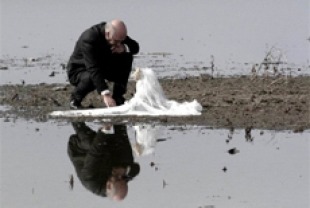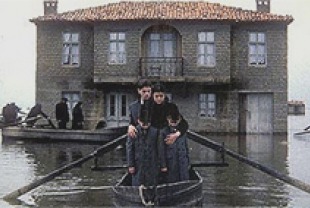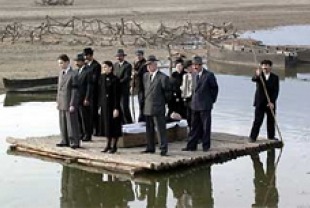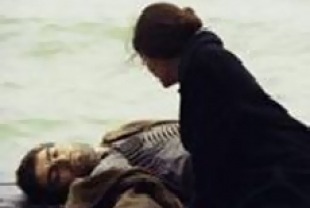This visually stunning film by Theo Angelopoulos is the first part of a planned trilogy whose goal is "a poetic summing up of the century that just ended." It covers a time period from 1919-1949, a violent and turbulent period for Greece. The impressive opening scene shows a large band of black-garbed refugees from Odessa who have returned to their homeland to settle just outside Thessaloniki. They are led by Spyros (Vasilis Kolovos), a noble leader in the community. He has a wife and a son named Alexis; they have brought with them Eleni, a young orphan girl. Complications ensue from this addition to their family when she falls in love with Alexis (Nikos Poursanidis) and they have two sons. Following the death of his wife, Spyros decides to wed Eleni (Alexandra Aidini) but she flees with Alexis on the day of the wedding. The young couple link up with Nikos (Giorgos Armenis), a violinist who leads a vagabond band of musicians. He is impressed with Alexis' talent as an accordionist. For a brief period they live in an opera house which has become a refuge for the homeless. There families and couples live in little cubicles.
Alexis and Eleni's story unfolds against the backdrop of Greek history during the 1930's, and 40's: homegrown fascism turns people into thugs, the people's front emerges and union activism is stifled, the Nazi's occupy the country, and the people of Greece fight with each other in a long and cruel civil war. It is crucial that we empathize with Eleni and Alexis, because they are the figures the audience is given to make the sweeping tragedy of this time period immediate and personal. But unlike the characters in Angelopoulos' powerful Eternity and a Day, we feel no deep emotional connection to this couple because they are never fleshed out as idiosyncratic human beings. Their hardships include the death of Spyros from a broken heart, the flooding of the village where they grew up, being ostracized by neighbors, and having to wandering as a result of war and constant conflict.
Near the end of the film, we are touched by the cumulative tide of suffering experienced by Eleni as she is separated from Alexis, imprisoned for years, and learns of the death of her two sons. She laments the suffering brought by wars — "only the uniforms change." Hopefully, the next two films in this trilogy will match both the visual creativity and the emotional vibrancy of Eternity and a Day. It is quite clear that in a project of this scope and imagination, more is needed than striking images of funeral flotillas and white sheets blowing in the wind. We need emotionally engaging stories that touch the heart and stir the soul.



